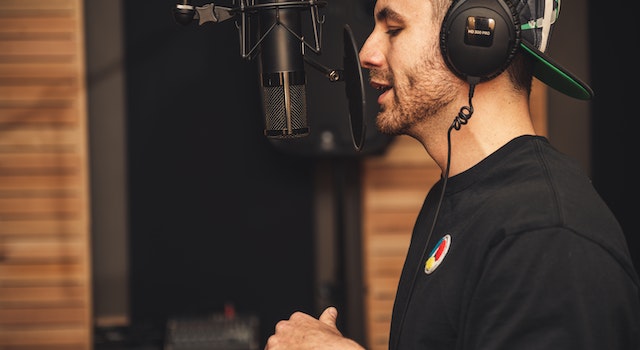How To Get Better At Singing?
To improve your art of singing, you need to do many essential things you can practice. It is important to keep practicing regularly. As with any ability, singing requires constant training to improve. It’s not just about singing; it also involves exercises to improve those vocal cords, enhance your breathing, and improve your ability to hear music.
The second step is to seek feedback from a professional vocal coach. A coach will help you find areas where you require improvement, provide exercises to work on, and provide advice regarding proper technique.
Thirdly, you should listen to diverse songs and research the singers you admire. Take note of their tone, phrasing dynamics, and other aspects of their performance that help them stand out. Try to incorporate a few methods into the way you sing. Also, be sure to ensure your health and vocal performance. This includes drinking enough water, avoiding smoking, excessively drinking alcohol, and ensuring you get enough sleep. Following these guidelines to improve your singing, you can gradually increase your singing abilities and become a more confident and proficient singer.
Foundation Of Singing
The fundamentals of singing include many key elements crucial to developing an effective, healthy voice. These elements include proper breathing technique, placement of the vocals and resonance, ear training, and music interpretation.
Proper Breathing Technique: The most crucial aspect of the singing technique is breath. Proper breathing can help you and your voice stay in control and avoid injuries or strain. When singing, you must take deep breaths from your diaphragm, filling your lungs with air and expanding your ribcage. While singing, you must employ the muscles of your abdomen to manage your breathing and support your voice. A regular breathing routine can aid in mastering this technique.
Vocal Placement and Resonance: Another crucial aspect of singing is placement and resonance. It involves using the correct muscles in your body to create sound and convey your voice. When singing, locate your voice in the facial mask, where your cheekbones, sinuses, and jaw are. This will help create an unmistakable, clear voice. It is also important to concentrate on using your resonators, like your head, chest, and throat, to enhance and amplify your voice. Vocal exercises can help improve this technique.
Ear Training: The training of your ears is an essential aspect of singing. This is developing your ability to precisely recognize and reproduce the pitch, melody, and harmonies. This skill lets you be in tune and harmonize with others. It is possible to improve your ear training by doing exercises that include singing arpeggios, scales, and intervals, in addition to working on sight-reading and listening to various types of music.
Musical Interpretation: Then, musical interpretation is a crucial component of singing. It involves conveying the emotion and significance of a song with your voice and phrasing. To do this successfully, it is essential to understand the song’s lyrics and melody in addition to the context within which it was composed. Additionally, you should develop your distinctive design and style of interpretation for the song and remain faithful to the original intention of the song.
By focusing on these essential aspects of singing, you will establish a solid vocal foundation and become more proficient and confident in your singing.
Developing Vocal Techniques
Improving your vocal techniques is vital to becoming a proficient and multi-faceted singer. There are a variety of key methods you can concentrate on to enhance your voice and increase its range and capabilities. These include breathing control, warm-up exercises for vocal registers, resonance, and vibrato.
Proper Breath Control: Controlling your breath is the base of a sound singing technique. Taking deep, long breaths is essential to strengthening your voice and maintaining a steady flow of air. Breathing exercises can help improve this ability, including breathing through your diaphragm and controlling your exhalation.
Vocal Warm-Up Exercises: Vocal warm-up exercises are essential to preparing your voice before singing. These exercises will help loosen the vocal cords, improve your breathing control, and expand the range of your voice. Warm-ups for your vocals could include lip trills, humming tongue twisters, and scales.
Resonance: Resonance refers to the quality of sound derived through the vibrating vocal cords and the amplifying of sound within the resonating chambers of the body. Learning how to use resonance to produce diverse tones and reduce vocal strain is essential. Techniques for developing resonance include learning to sing with the mask on your face and the throat, chest, and head as chambers for resonating.
Vocal Registers: Vocal registers describe the ranges you can use with your voice and the mechanism that produces the sound. Utilizing your head and chest and mixed voices can help you broaden your range and create an edgier sound. You can master the control of your registers with different exercises and techniques, like slipping between various registers and then slowly mixing the registers.
Vibrato: Vibrato is a slight change in volume and pitch that gives warmth and expression to your voice. It’s the result of good breathing and singing technique. It is possible to practice sustaining notes by using regular, steady breathing control and gradually adding the slightest variation in the pitch to improve your vibrato.
Focusing on these important vocal techniques makes it possible to build a solid vocal foundation and develop into a more efficient and versatile performer. It is essential to practice regularly, work with a coach, and remain focused on your goals to get the most out of your vocal skills.
Engaging And Connecting With Your Audience
Connecting with the audience is essential to being an accomplished singer. If you’re performing on stage or in an intimate location, there are many important ways to interact with your audience to create an unforgettable experience. This includes preparation and performance, presence, communication, and emotion.
Preparation: The first step to connecting with the audience is thoroughly preparing before your show. This means practicing your songs, selecting the best product for your crowd, and preparing the stage layout and lighting. Also, you should consider your appearance, attire, and the props and instruments you’ll use. The more prepared you are, the more relaxed and comfortable you’ll be on stage.
Stage Presence: Stage presence is an additional important element of engaging your viewers. It involves using your facial expressions and body language to convey energy and emotion and engaging the audience with eye contact and movements. It is also important to take note of the posture of your body, your breath, and your vocal technique to ensure your performance is effective and constant.
Communication: Communication is crucial to connecting with the audience. It’s about your vocal skills and the ability to engage the audience via banter and stories. It is possible to use humor, personal stories, and the participation of your audience to create a sense of intimacy and involvement.
Emotional Expression: Additionally, emotion-based expression is an essential element of connecting with your audience. This means conveying the meaning and emotion of your music through your body language and vocals. Aiming to engage with your audience emotionally by using your performance to communicate the message you want to convey and generate a feeling of connection and intimacy is important.
If you focus on these important aspects of your performance and engage with your audience, you can create an unforgettable and enjoyable experience for them. It’s essential to regularly practice, get feedback from your peers, and remain focused on the goals you want to achieve to maximize your performance. Through dedication and perseverance, you can become an experienced and confident performer who can engage with audiences of all kinds.
Vocal Health And Maintenance
The health and maintenance of your voice are crucial to maintaining a strong-sounding voice and avoiding injuries or strain. There are many ways to safeguard your voice and ensure it is healthy. This includes proper hydration, warm-ups and cool-downs, recovery and rest, and avoiding unhealthy routines.
Hydration: Hydration is vital to keeping your vocal cords in good shape and healthy. Make sure you drink plenty of fluids throughout the day. But especially between and after your singing. Add lemon or honey to warm water for a hydrating and soothing drink. Beware of caffeine, alcohol, or other sugary drinks because they can dry out your vocal cords and cause injury or strain.
Warm-Ups and Cool-Downs: Cool-downs and warm-ups are essential for maintaining the health of your vocals. These exercises can help prepare your vocal cords for singing and prevent strain or injury. Warm-ups could include exercises for vocals as well as stretching and breathing techniques. Cool-downs may include gentle humming and relaxation techniques to aid in recovering your voice after singing.
Rest and Recovery: Recovery and rest are essential for ensuring the health of your vocals. It is important to ensure that you rest well and be careful not to talk or sing frequently, especially if you’re sick or suffering from fatigue in your voice. It’s important to take breaks between rehearsals or performances to keep from pushing your voice to the limit.
Avoiding Harmful Habits: Refraining from harmful behaviors is another crucial aspect of maintaining good health for your voice. This includes not smoking or being exposed to smoke from secondhand sources, and limiting your intake of caffeine and alcohol. It is also essential to avoid cleaning your throat frequently because it can cause irritation and strain.
If you focus on these important aspects of well-being and maintenance, you can safeguard your voice and ensure it’s in good condition to sing and perform. It is essential to consult with a singer-coach. Seek medical assistance and listen to your body to avoid injuries or strains. With the right care, you’ll be able to maintain an energized, healthy voice and sing for a long time.
How Long Will It Take To Develop Your Ability To Sing?
The time needed to develop the ability to sing can vary according to several variables. These include the singer’s inherent ability as well as their time commitment and the effort that they commit to practicing, as well as the level of instruction they receive. Here are a few important factors to consider when estimating how much time it will take to develop a singer’s singing abilities:
Natural Ability: Some singers may possess an inherent talent for singing; others might have to put in more effort to improve their talents. Naturally talented people might see quicker progress and growth, whereas others might have to dedicate more effort and time to achieve similar outcomes.
Practice Time: The time and effort a performer commits to practicing are crucial to how fast they will enhance their abilities. Singers who consistently practice, for instance, often—at least several times per week—are more likely to make faster progress than those who only practice occasionally or even only on occasion.
Quality of Instruction: The quality of the singer’s instruction may affect the time it takes to build their abilities. Engaging a skilled and experienced vocal coach will assist a singer in identifying areas in which they require improvements and then providing specific exercises that address these areas. A coach will also offer advice on the correct technique and feedback on your performance.
Specific Goals: A singer’s goals could determine the time it takes to build their skills. If a singer is looking to master a particular technique, like breath control or vibrato, they may see improvements in that area quicker than in other areas. But if a performer is working to develop more range or a sophisticated vocal style, it could take a bit longer to see a significant improvement.
It’s hard to know exactly how long it will take to increase your singing ability. With constant practice, good training, and a specific list of goals, singing professionals can expect an improvement in their singing over time. It’s essential to remain persevering, patient, and committed to the art of singing. It’s also important to always seek new ways to improve as a singer.
Does Anyone Have The Ability To Sing?
Anyone could learn to sing. While some people might have an inherent talent for singing, it’s an ability that can be developed and honed through practice and instruction. Here are a few important aspects to consider when deciding if anyone can be taught to sing:
Anatomy and Physiology: Although everyone can learn how to sing, it is important to understand that anatomy and vocal physiology can affect the ease and effectiveness of singing. Certain people might have physical traits that make singing more difficult; however, they can enhance their singing skills with the right techniques and instruction.
Proper Instruction: Proper instruction is crucial to learning to sing successfully. An experienced vocal instructor can aid an individual in developing proper technique and provide advice on posture, breathing, and other facets of singing. They also offer feedback and support, helping students build confidence and motivation.
Practice and Dedication: As with all skill areas, singing requires regular practice and commitment to develop. Regular practice will help an individual expand their vocal range, tone, and expression and improve endurance and stamina. A singer’s dedication to the art of singing, which includes regular practice as well as listening to music and seeking feedback, will aid them in reaching their maximum potential.
Mindset and Attitude: In the end, attitude and mindset are crucial when learning to sing. A positive outlook and growth mindset can assist the student in overcoming difficulties and setbacks, whereas being fixed could lead to discontent and frustration. The desire to continue learning and growing, a love of curiosity and exploration, and a belief in one’s capacity to grow are all crucial elements in learning to sing.
Although some people might have an aptitude for singing, everyone can learn to sing with the proper guidance, practice, and dedication. It is important to sing with a positive mindset, a desire to learn and improve, and an interest in singing. With these elements, anyone can improve their singing abilities and become a proficient and confident singer.
When Should I Be Singing?
The frequency of practicing singing varies based on the person’s goals and degree of commitment. But, as a general rule of thumb, singing regularly can improve vocal performance and help develop a better technique. Here are some important factors to consider when deciding on the frequency of singing:
Goals and Commitment: The goal of the singer, as well as the degree of dedication to the art of singing, may affect how often they need to practice. Singers looking to make a career out of the field of music or aspiring to be professional performers may have to work for hours every day. In contrast, people who sing for pleasure or as a hobby might only have to work for a shorter time.
Practice Time: The length of time spent in each practice session is an important factor to consider. Singers who are beginning their journey might find it beneficial to work for shorter durations, like 15–30 minutes, to avoid straining or fatigue of the vocals. When vocal stamina improves, the time for practice can be extended to 30 minutes or longer.
Practice Schedule: A regular schedule of practice is also beneficial. Singers who practice regularly on a daily schedule, for example, often throughout the week, will likely make greater progress than those who practice only occasionally. It is also beneficial to keep practicing at the same time every day or week to establish a routine.
Quality of Practice: The quality of the training session is crucial to the duration and frequency of practice. Length of the practice. Concentrated and focused practice incorporating warm-ups, voice exercises, and specific exercises for areas that require improvement can be more effective than singing for a prolonged duration without guidance.
Singers should try to regularly practice at least a few times per week, emphasizing the quality of their singing, not just the quantity. As stamina and vocal power grow, practice times can be increased to develop greater endurance and technique. By establishing a regular program of practice and focusing on areas for improvement, singers will see significant improvements in their singing skills.
What Are The Typical Mistakes To Avoid While Singing?
While learning to sing, you will encounter a few common mistakes that singers make that could slow their progress and even result in vocal strain or injuries. Here are a few common mistakes to avoid while singing:
Pushing Too Hard: One of the biggest mistakes new singers make is pushing too hard or singing too loudly. This can result in tension and fatigue in the vocal tract and could cause injuries to the vocal cords. It is important to begin with a gentle warm-up and gradually progress to more demanding workouts and music.
Poor Breathing Technique: Breathing is a vital component of singing. Poor breathing habits can lead to tension in the vocal cords as well as poor quality of sound. It is important to concentrate on breathing deeply and diaphragmatically and refrain from breathing shallowly or with tension that could cause tension in the neck and throat.
Poor posture: Poor posture can also affect the quality of your singing. Hunching or slouching can impede breathing, hinder proper breathing support, and result in low-quality sound and strain on the vocal cords. It is important to maintain good posture by standing straight with your shoulders relaxed and your chest open.
Straining the Voice: Many singers attempt to reach higher notes or even sing beyond their natural range. This could cause strain on the vocal cords or injuries. It is important to stay within the singer’s range and gradually increase the difficulty to more difficult melodies and tones.
Neglecting Ear Training: The practice of ear training is vital to developing the ability to sing in tune and gaining the ability to recognize pitch. If you don’t train this skill, it can result in low-quality sound and a lack of musicality when singing. It is important to do ear training exercises frequently to build this ability.
Lack of Practice: Inexperience is also a typical error when trying to learn to sing. Singing requires constant training and dedication to improving. It’s essential to develop an ongoing practice routine and concentrate on the specific areas for improvement.
By avoiding these common mistakes and focusing on correct technique, breathing control posture, breath control, and ear training, vocalists can improve their abilities and become proficient and confident singers. It is essential to consult a professional vocal coach and seek out feedback and direction to avoid mistakes that could be made and improve faster.
FAQ’s
How can I improve my singing voice?
There are several ways to enhance your singing voice. Start by practicing regularly to strengthen your vocal muscles and improve breath control. Consider taking vocal lessons from a qualified instructor who can provide personalized guidance. Warm-up exercises, proper posture, and relaxation techniques can also contribute to better singing.
Are there specific vocal exercises I can do to improve my singing?
Yes, there are various vocal exercises that can help improve your singing. These include scales, arpeggios, lip trills, and vowel drills. These exercises target different aspects of your voice, such as pitch accuracy, vocal range, and flexibility. Consistent practice of these exercises can enhance your overall vocal abilities.
How can I expand my vocal range?
Expanding your vocal range takes time and practice. Start by identifying your current range by singing from your lowest to highest comfortable note. Gradually work on extending your range by practicing exercises that focus on gradually reaching higher or lower notes. However, it’s important to avoid straining your voice and always prioritize proper technique to prevent vocal damage.
What can I do to improve my pitch accuracy?
Developing pitch accuracy requires training your ears and vocal muscles. Ear training exercises, such as singing along with a piano or using pitch-matching apps, can help you develop a better sense of pitch. Additionally, practicing scales and intervals regularly can train your vocal muscles to hit the right notes more accurately.
How important is proper breathing technique in singing?
Proper breathing technique is crucial for singing. It enables better vocal control, sustained notes, and reduces strain on your vocal cords. Practice diaphragmatic breathing, where you engage your diaphragm to take deep breaths, allowing for better breath support while singing. This technique helps maintain consistent airflow and improves overall vocal performance.
Are there any tips for reducing stage fright or performance anxiety while singing?
Performance anxiety is common among singers, but there are strategies to help manage it. Prepare well by practicing your songs thoroughly, as confidence comes from being well-rehearsed. Breathing exercises and physical warm-ups before performing can help reduce anxiety. Visualize a successful performance and remind yourself that mistakes are part of the learning process. Gradually exposing yourself to performing in front of others can also help build confidence over time.
How To Get Better At Singing?
To improve your art of singing, you need to do many essential things you can practice. It is important to keep practicing regularly. As with any ability, singing requires constant training to improve. It’s not just about singing; it also involves exercises to improve those vocal cords, enhance your breathing, and improve your ability to hear music.
The second step is to seek feedback from a professional vocal coach. A coach will help you find areas where you require improvement, provide exercises to work on, and provide advice regarding proper technique.
Thirdly, you should listen to diverse songs and research the singers you admire. Take note of their tone, phrasing dynamics, and other aspects of their performance that help them stand out. Try to incorporate a few methods into the way you sing. Also, be sure to ensure your health and vocal performance. This includes drinking enough water, avoiding smoking, excessively drinking alcohol, and ensuring you get enough sleep. Following these guidelines to improve your singing, you can gradually increase your singing abilities and become a more confident and proficient singer.
Foundation Of Singing
The fundamentals of singing include many key elements crucial to developing an effective, healthy voice. These elements include proper breathing technique, placement of the vocals and resonance, ear training, and music interpretation.
Proper Breathing Technique: The most crucial aspect of the singing technique is breath. Proper breathing can help you and your voice stay in control and avoid injuries or strain. When singing, you must take deep breaths from your diaphragm, filling your lungs with air and expanding your ribcage. While singing, you must employ the muscles of your abdomen to manage your breathing and support your voice. A regular breathing routine can aid in mastering this technique.
Vocal Placement and Resonance: Another crucial aspect of singing is placement and resonance. It involves using the correct muscles in your body to create sound and convey your voice. When singing, locate your voice in the facial mask, where your cheekbones, sinuses, and jaw are. This will help create an unmistakable, clear voice. It is also important to concentrate on using your resonators, like your head, chest, and throat, to enhance and amplify your voice. Vocal exercises can help improve this technique.
Ear Training: The training of your ears is an essential aspect of singing. This is developing your ability to precisely recognize and reproduce the pitch, melody, and harmonies. This skill lets you be in tune and harmonize with others. It is possible to improve your ear training by doing exercises that include singing arpeggios, scales, and intervals, in addition to working on sight-reading and listening to various types of music.
Musical Interpretation: Then, musical interpretation is a crucial component of singing. It involves conveying the emotion and significance of a song with your voice and phrasing. To do this successfully, it is essential to understand the song’s lyrics and melody in addition to the context within which it was composed. Additionally, you should develop your distinctive design and style of interpretation for the song and remain faithful to the original intention of the song.
By focusing on these essential aspects of singing, you will establish a solid vocal foundation and become more proficient and confident in your singing.
Developing Vocal Techniques
Improving your vocal techniques is vital to becoming a proficient and multi-faceted singer. There are a variety of key methods you can concentrate on to enhance your voice and increase its range and capabilities. These include breathing control, warm-up exercises for vocal registers, resonance, and vibrato.
Proper Breath Control: Controlling your breath is the base of a sound singing technique. Taking deep, long breaths is essential to strengthening your voice and maintaining a steady flow of air. Breathing exercises can help improve this ability, including breathing through your diaphragm and controlling your exhalation.
Vocal Warm-Up Exercises: Vocal warm-up exercises are essential to preparing your voice before singing. These exercises will help loosen the vocal cords, improve your breathing control, and expand the range of your voice. Warm-ups for your vocals could include lip trills, humming tongue twisters, and scales.
Resonance: Resonance refers to the quality of sound derived through the vibrating vocal cords and the amplifying of sound within the resonating chambers of the body. Learning how to use resonance to produce diverse tones and reduce vocal strain is essential. Techniques for developing resonance include learning to sing with the mask on your face and the throat, chest, and head as chambers for resonating.
Vocal Registers: Vocal registers describe the ranges you can use with your voice and the mechanism that produces the sound. Utilizing your head and chest and mixed voices can help you broaden your range and create an edgier sound. You can master the control of your registers with different exercises and techniques, like slipping between various registers and then slowly mixing the registers.
Vibrato: Vibrato is a slight change in volume and pitch that gives warmth and expression to your voice. It’s the result of good breathing and singing technique. It is possible to practice sustaining notes by using regular, steady breathing control and gradually adding the slightest variation in the pitch to improve your vibrato.
Focusing on these important vocal techniques makes it possible to build a solid vocal foundation and develop into a more efficient and versatile performer. It is essential to practice regularly, work with a coach, and remain focused on your goals to get the most out of your vocal skills.
Engaging And Connecting With Your Audience
Connecting with the audience is essential to being an accomplished singer. If you’re performing on stage or in an intimate location, there are many important ways to interact with your audience to create an unforgettable experience. This includes preparation and performance, presence, communication, and emotion.
Preparation: The first step to connecting with the audience is thoroughly preparing before your show. This means practicing your songs, selecting the best product for your crowd, and preparing the stage layout and lighting. Also, you should consider your appearance, attire, and the props and instruments you’ll use. The more prepared you are, the more relaxed and comfortable you’ll be on stage.
Stage Presence: Stage presence is an additional important element of engaging your viewers. It involves using your facial expressions and body language to convey energy and emotion and engaging the audience with eye contact and movements. It is also important to take note of the posture of your body, your breath, and your vocal technique to ensure your performance is effective and constant.
Communication: Communication is crucial to connecting with the audience. It’s about your vocal skills and the ability to engage the audience via banter and stories. It is possible to use humor, personal stories, and the participation of your audience to create a sense of intimacy and involvement.
Emotional Expression: Additionally, emotion-based expression is an essential element of connecting with your audience. This means conveying the meaning and emotion of your music through your body language and vocals. Aiming to engage with your audience emotionally by using your performance to communicate the message you want to convey and generate a feeling of connection and intimacy is important.
If you focus on these important aspects of your performance and engage with your audience, you can create an unforgettable and enjoyable experience for them. It’s essential to regularly practice, get feedback from your peers, and remain focused on the goals you want to achieve to maximize your performance. Through dedication and perseverance, you can become an experienced and confident performer who can engage with audiences of all kinds.
Vocal Health And Maintenance
The health and maintenance of your voice are crucial to maintaining a strong-sounding voice and avoiding injuries or strain. There are many ways to safeguard your voice and ensure it is healthy. This includes proper hydration, warm-ups and cool-downs, recovery and rest, and avoiding unhealthy routines.
Hydration: Hydration is vital to keeping your vocal cords in good shape and healthy. Make sure you drink plenty of fluids throughout the day. But especially between and after your singing. Add lemon or honey to warm water for a hydrating and soothing drink. Beware of caffeine, alcohol, or other sugary drinks because they can dry out your vocal cords and cause injury or strain.
Warm-Ups and Cool-Downs: Cool-downs and warm-ups are essential for maintaining the health of your vocals. These exercises can help prepare your vocal cords for singing and prevent strain or injury. Warm-ups could include exercises for vocals as well as stretching and breathing techniques. Cool-downs may include gentle humming and relaxation techniques to aid in recovering your voice after singing.
Rest and Recovery: Recovery and rest are essential for ensuring the health of your vocals. It is important to ensure that you rest well and be careful not to talk or sing frequently, especially if you’re sick or suffering from fatigue in your voice. It’s important to take breaks between rehearsals or performances to keep from pushing your voice to the limit.
Avoiding Harmful Habits: Refraining from harmful behaviors is another crucial aspect of maintaining good health for your voice. This includes not smoking or being exposed to smoke from secondhand sources, and limiting your intake of caffeine and alcohol. It is also essential to avoid cleaning your throat frequently because it can cause irritation and strain.
If you focus on these important aspects of well-being and maintenance, you can safeguard your voice and ensure it’s in good condition to sing and perform. It is essential to consult with a singer-coach. Seek medical assistance and listen to your body to avoid injuries or strains. With the right care, you’ll be able to maintain an energized, healthy voice and sing for a long time.
How Long Will It Take To Develop Your Ability To Sing?
The time needed to develop the ability to sing can vary according to several variables. These include the singer’s inherent ability as well as their time commitment and the effort that they commit to practicing, as well as the level of instruction they receive. Here are a few important factors to consider when estimating how much time it will take to develop a singer’s singing abilities:
Natural Ability: Some singers may possess an inherent talent for singing; others might have to put in more effort to improve their talents. Naturally talented people might see quicker progress and growth, whereas others might have to dedicate more effort and time to achieve similar outcomes.
Practice Time: The time and effort a performer commits to practicing are crucial to how fast they will enhance their abilities. Singers who consistently practice, for instance, often—at least several times per week—are more likely to make faster progress than those who only practice occasionally or even only on occasion.
Quality of Instruction: The quality of the singer’s instruction may affect the time it takes to build their abilities. Engaging a skilled and experienced vocal coach will assist a singer in identifying areas in which they require improvements and then providing specific exercises that address these areas. A coach will also offer advice on the correct technique and feedback on your performance.
Specific Goals: A singer’s goals could determine the time it takes to build their skills. If a singer is looking to master a particular technique, like breath control or vibrato, they may see improvements in that area quicker than in other areas. But if a performer is working to develop more range or a sophisticated vocal style, it could take a bit longer to see a significant improvement.
It’s hard to know exactly how long it will take to increase your singing ability. With constant practice, good training, and a specific list of goals, singing professionals can expect an improvement in their singing over time. It’s essential to remain persevering, patient, and committed to the art of singing. It’s also important to always seek new ways to improve as a singer.
Does Anyone Have The Ability To Sing?
Anyone could learn to sing. While some people might have an inherent talent for singing, it’s an ability that can be developed and honed through practice and instruction. Here are a few important aspects to consider when deciding if anyone can be taught to sing:
Anatomy and Physiology: Although everyone can learn how to sing, it is important to understand that anatomy and vocal physiology can affect the ease and effectiveness of singing. Certain people might have physical traits that make singing more difficult; however, they can enhance their singing skills with the right techniques and instruction.
Proper Instruction: Proper instruction is crucial to learning to sing successfully. An experienced vocal instructor can aid an individual in developing proper technique and provide advice on posture, breathing, and other facets of singing. They also offer feedback and support, helping students build confidence and motivation.
Practice and Dedication: As with all skill areas, singing requires regular practice and commitment to develop. Regular practice will help an individual expand their vocal range, tone, and expression and improve endurance and stamina. A singer’s dedication to the art of singing, which includes regular practice as well as listening to music and seeking feedback, will aid them in reaching their maximum potential.
Mindset and Attitude: In the end, attitude and mindset are crucial when learning to sing. A positive outlook and growth mindset can assist the student in overcoming difficulties and setbacks, whereas being fixed could lead to discontent and frustration. The desire to continue learning and growing, a love of curiosity and exploration, and a belief in one’s capacity to grow are all crucial elements in learning to sing.
Although some people might have an aptitude for singing, everyone can learn to sing with the proper guidance, practice, and dedication. It is important to sing with a positive mindset, a desire to learn and improve, and an interest in singing. With these elements, anyone can improve their singing abilities and become a proficient and confident singer.
When Should I Be Singing?
The frequency of practicing singing varies based on the person’s goals and degree of commitment. But, as a general rule of thumb, singing regularly can improve vocal performance and help develop a better technique. Here are some important factors to consider when deciding on the frequency of singing:
Goals and Commitment: The goal of the singer, as well as the degree of dedication to the art of singing, may affect how often they need to practice. Singers looking to make a career out of the field of music or aspiring to be professional performers may have to work for hours every day. In contrast, people who sing for pleasure or as a hobby might only have to work for a shorter time.
Practice Time: The length of time spent in each practice session is an important factor to consider. Singers who are beginning their journey might find it beneficial to work for shorter durations, like 15–30 minutes, to avoid straining or fatigue of the vocals. When vocal stamina improves, the time for practice can be extended to 30 minutes or longer.
Practice Schedule: A regular schedule of practice is also beneficial. Singers who practice regularly on a daily schedule, for example, often throughout the week, will likely make greater progress than those who practice only occasionally. It is also beneficial to keep practicing at the same time every day or week to establish a routine.
Quality of Practice: The quality of the training session is crucial to the duration and frequency of practice. Length of the practice. Concentrated and focused practice incorporating warm-ups, voice exercises, and specific exercises for areas that require improvement can be more effective than singing for a prolonged duration without guidance.
Singers should try to regularly practice at least a few times per week, emphasizing the quality of their singing, not just the quantity. As stamina and vocal power grow, practice times can be increased to develop greater endurance and technique. By establishing a regular program of practice and focusing on areas for improvement, singers will see significant improvements in their singing skills.
What Are The Typical Mistakes To Avoid While Singing?
While learning to sing, you will encounter a few common mistakes that singers make that could slow their progress and even result in vocal strain or injuries. Here are a few common mistakes to avoid while singing:
Pushing Too Hard: One of the biggest mistakes new singers make is pushing too hard or singing too loudly. This can result in tension and fatigue in the vocal tract and could cause injuries to the vocal cords. It is important to begin with a gentle warm-up and gradually progress to more demanding workouts and music.
Poor Breathing Technique: Breathing is a vital component of singing. Poor breathing habits can lead to tension in the vocal cords as well as poor quality of sound. It is important to concentrate on breathing deeply and diaphragmatically and refrain from breathing shallowly or with tension that could cause tension in the neck and throat.
Poor posture: Poor posture can also affect the quality of your singing. Hunching or slouching can impede breathing, hinder proper breathing support, and result in low-quality sound and strain on the vocal cords. It is important to maintain good posture by standing straight with your shoulders relaxed and your chest open.
Straining the Voice: Many singers attempt to reach higher notes or even sing beyond their natural range. This could cause strain on the vocal cords or injuries. It is important to stay within the singer’s range and gradually increase the difficulty to more difficult melodies and tones.
Neglecting Ear Training: The practice of ear training is vital to developing the ability to sing in tune and gaining the ability to recognize pitch. If you don’t train this skill, it can result in low-quality sound and a lack of musicality when singing. It is important to do ear training exercises frequently to build this ability.
Lack of Practice: Inexperience is also a typical error when trying to learn to sing. Singing requires constant training and dedication to improving. It’s essential to develop an ongoing practice routine and concentrate on the specific areas for improvement.
By avoiding these common mistakes and focusing on correct technique, breathing control posture, breath control, and ear training, vocalists can improve their abilities and become proficient and confident singers. It is essential to consult a professional vocal coach and seek out feedback and direction to avoid mistakes that could be made and improve faster.
FAQ’s
How can I improve my singing voice?
There are several ways to enhance your singing voice. Start by practicing regularly to strengthen your vocal muscles and improve breath control. Consider taking vocal lessons from a qualified instructor who can provide personalized guidance. Warm-up exercises, proper posture, and relaxation techniques can also contribute to better singing.
Are there specific vocal exercises I can do to improve my singing?
Yes, there are various vocal exercises that can help improve your singing. These include scales, arpeggios, lip trills, and vowel drills. These exercises target different aspects of your voice, such as pitch accuracy, vocal range, and flexibility. Consistent practice of these exercises can enhance your overall vocal abilities.
How can I expand my vocal range?
Expanding your vocal range takes time and practice. Start by identifying your current range by singing from your lowest to highest comfortable note. Gradually work on extending your range by practicing exercises that focus on gradually reaching higher or lower notes. However, it’s important to avoid straining your voice and always prioritize proper technique to prevent vocal damage.
What can I do to improve my pitch accuracy?
Developing pitch accuracy requires training your ears and vocal muscles. Ear training exercises, such as singing along with a piano or using pitch-matching apps, can help you develop a better sense of pitch. Additionally, practicing scales and intervals regularly can train your vocal muscles to hit the right notes more accurately.
How important is proper breathing technique in singing?
Proper breathing technique is crucial for singing. It enables better vocal control, sustained notes, and reduces strain on your vocal cords. Practice diaphragmatic breathing, where you engage your diaphragm to take deep breaths, allowing for better breath support while singing. This technique helps maintain consistent airflow and improves overall vocal performance.
Are there any tips for reducing stage fright or performance anxiety while singing?
Performance anxiety is common among singers, but there are strategies to help manage it. Prepare well by practicing your songs thoroughly, as confidence comes from being well-rehearsed. Breathing exercises and physical warm-ups before performing can help reduce anxiety. Visualize a successful performance and remind yourself that mistakes are part of the learning process. Gradually exposing yourself to performing in front of others can also help build confidence over time.













